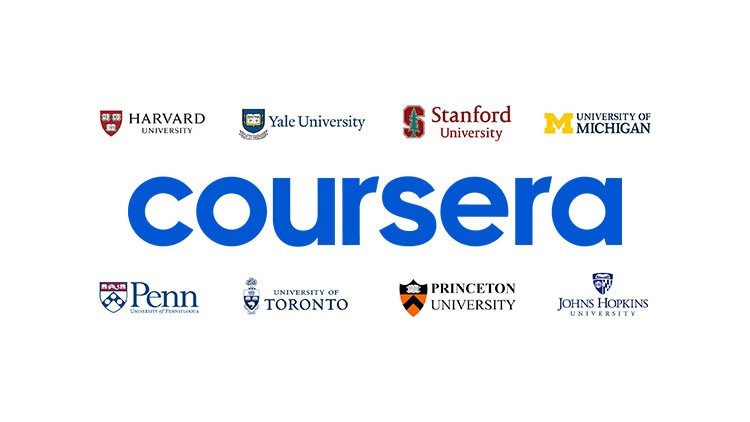In today’s data-driven world, the demand for skilled data scientists is at an all-time high. From personalized marketing strategies to healthcare advancements and predictive analytics in finance, data science is transforming industries and driving innovation. At the heart of this revolution is Coursera, an online learning platform that has democratized access to data science education, empowering learners worldwide to acquire essential skills and thrive in the digital age.
Understanding Data Science
Data science represents an interdisciplinary field that employs scientific methods, algorithms, and systems to extract valuable insights and knowledge from diverse data sources. This dynamic discipline integrates principles from mathematics, statistics, computer science, and specialized domain knowledge to decipher intricate datasets and facilitate informed decision-making processes.
At its core, data science serves as a powerful toolset for unraveling the complexities embedded within vast datasets. It leverages mathematical and statistical techniques to uncover patterns, trends, and correlations that might otherwise remain obscured. By applying computational algorithms and advanced analytical methods, data scientists transform raw data into actionable insights that drive strategic business decisions, scientific discoveries, and societal advancements.
Central to the practice of data science is its reliance on rigorous methodologies and systematic approaches to data analysis. This involves defining clear objectives, formulating hypotheses, and rigorously testing them using empirical data. Through iterative processes of data exploration, cleaning, modeling, and interpretation, data scientists not only validate existing theories but also uncover new insights that may lead to innovative breakthroughs.
Moreover, data science thrives on the synergy between theoretical knowledge and practical application. It bridges the gap between abstract mathematical concepts and real-world challenges, offering practical solutions to complex problems across various domains. Whether it’s optimizing supply chain operations, enhancing healthcare outcomes, or personalizing user experiences in digital platforms, data science empowers organizations to harness the full potential of their data assets.
In essence, data science embodies a blend of analytical prowess and domain expertise, enabling professionals to navigate the vast and evolving landscape of data-driven decision-making. By embracing continuous learning and adaptation to emerging technologies, data scientists remain at the forefront of innovation, driving transformative changes in industries and societies alike.
Coursera’s Contribution to Data Education
Founded in 2012 by Stanford professors Andrew Ng and Daphne Koller, Coursera aimed to provide universal access to high-quality education. Over the years, it has evolved into a global platform offering thousands of courses, specializations, and even degree programs from top universities and organizations worldwide. Coursera’s impact on data education is profound, catering to both aspiring data scientists and professionals seeking to enhance their skills.
1. Accessibility and Flexibility: Coursera’s platform is designed to be accessible to anyone with an internet connection, breaking down geographical barriers to education. Learners can enroll in courses from prestigious institutions like Stanford, Johns Hopkins, and the University of Michigan, among others, without the constraints of traditional classroom settings. This flexibility is particularly beneficial for working professionals looking to upskill or change careers.
2. Comprehensive Course Offerings: Coursera offers a wide range of data science courses, covering fundamental concepts such as statistics, programming languages like Python and R, data visualization, machine learning, and deep learning. These courses are designed by industry experts and academics who bring real-world experience and cutting-edge research into the curriculum.
3. Specializations and Professional Certificates: Beyond individual courses, Coursera provides specialized tracks that culminate in professional certificates. These specializations dive deeper into specific areas of data science, such as data analysis, big data, and artificial intelligence. Completing a specialization not only demonstrates proficiency but also enhances one’s credibility in the job market.
4. Hands-On Learning and Practical Projects: Data science is as much about practical application as it is about theory. Coursera integrates hands-on learning through assignments, quizzes, and real-world projects. Learners gain practical experience by analyzing data sets, building predictive models, and interpreting results—a crucial aspect in developing proficiency in data science.
5. Collaborations with Industry Leaders: Coursera collaborates with leading tech companies and industry experts to offer courses that are relevant to current industry trends and demands. This partnership ensures that the curriculum remains up-to-date and aligned with the skills employers seek in data science professionals.
Impact on Learners and Professionals
The influence of Coursera’s data science courses extends well beyond theoretical knowledge acquisition. Learners worldwide have harnessed these skills to propel their careers forward, securing promotions, and transitioning into pivotal data-centric roles within their organizations. For instance, marketing professionals have utilized Coursera’s data analytics courses to refine campaign strategies, while healthcare practitioners have implemented machine learning techniques to enhance patient care outcomes.
Case Study: Maria’s Journey to Data Science Excellence
Maria, a marketing analyst based in Spain, embarked on Coursera’s Data Science Specialization provided by Johns Hopkins University. Engaging in rigorous coursework and practical projects, Maria honed her proficiency in programming languages such as R, statistical analysis, and cutting-edge machine learning algorithms. Equipped with a professional certificate from Coursera, Maria successfully transitioned into a data scientist role within her company. Here, she spearheads data-driven initiatives that fuel business growth and foster innovation.
Maria’s journey exemplifies the transformative impact of Coursera’s data science programs. By equipping learners with practical skills and industry-recognized credentials, Coursera empowers professionals to thrive in the data-driven economy. This not only enhances individual career trajectories but also strengthens organizational capabilities, fostering a culture of continuous learning and innovation.
Coursera’s commitment to accessible, high-quality education ensures that learners like Maria can leverage flexible, online learning pathways to advance their expertise and achieve their professional aspirations. As the demand for data science proficiency continues to rise across diverse sectors, Coursera remains at the forefront, bridging the skills gap and empowering learners worldwide to make meaningful contributions in their respective fields.
Certifications and Accreditation in Data Science
Professional certifications and accreditation provided by Coursera play a crucial role in enhancing the credibility and marketability of individuals in the competitive job market of data science. These credentials validate the skills and knowledge acquired through rigorous coursework and practical applications, signaling to employers and peers alike that the holder is proficient in essential data science concepts and tools.
1. Validating Skills and Knowledge: Coursera’s certifications and accreditation serve as tangible proof of a learner’s proficiency in data science. By completing courses and specializations designed by top universities and industry experts, individuals demonstrate mastery in areas such as statistics, programming languages (e.g., Python, R), machine learning algorithms, and data visualization. This validation is critical for job seekers looking to differentiate themselves in a field where practical expertise is highly valued.
2. Industry Recognition and Relevance: The credibility of Coursera’s certifications is bolstered by partnerships with leading tech companies and universities globally. These collaborations ensure that course content remains relevant to current industry trends and demands, aligning closely with the skills sought after by employers in various sectors. As a result, holding a Coursera certification not only validates one’s knowledge but also enhances employability across diverse industries that rely on data-driven decision-making.
3. Career Advancement Opportunities: For professionals already working in data-intensive roles or aspiring to transition into such positions, Coursera’s certifications offer a pathway to career advancement. Employers increasingly prioritize candidates with demonstrable skills and practical experience in data science. By earning a Coursera certification, individuals can leverage their enhanced credibility to pursue job promotions, salary increases, or opportunities in specialized areas within data science such as artificial intelligence, big data analytics, and data engineering.
4. Flexibility and Accessibility: Coursera’s online platform provides flexibility in learning, allowing individuals to earn certifications at their own pace and from anywhere in the world. This accessibility is particularly advantageous for working professionals who seek to upskill or change careers without disrupting their current commitments. The ability to access high-quality education from renowned institutions like Stanford, Johns Hopkins, and the University of Michigan enhances the value proposition of Coursera certifications, making them a viable choice for lifelong learners.
5. Peer Validation and Community Engagement: Coursera’s peer-reviewed assignments and community forums foster a collaborative learning environment where learners receive constructive feedback and engage in knowledge sharing with peers and instructors. This interactive approach not only enhances learning outcomes but also strengthens the credibility of certifications through peer validation and recognition within the data science community.
Future Trends in Data Education
As technology continues to evolve, so too does the field of data science. Coursera is at the forefront of integrating emerging technologies such as artificial intelligence and cloud computing into its curriculum. These advancements not only prepare learners for future challenges but also equip them with the skills to innovate and drive meaningful change in their respective industries.
Join the Data Revolution with Coursera
Whether you’re a novice looking to explore the fundamentals of data science or an experienced professional seeking advanced knowledge, Coursera offers a pathway to success. Join millions of learners worldwide who are shaping the future of data science through Coursera’s comprehensive and accessible online education platform.
In conclusion, Coursera’s role in democratizing data education is pivotal in bridging the skills gap and empowering individuals to thrive in the digital economy. By providing flexible learning opportunities, comprehensive course offerings, and hands-on experience, Coursera continues to inspire and transform the careers of aspiring data scientists globally.




.webp)




